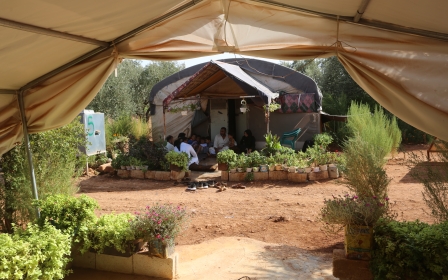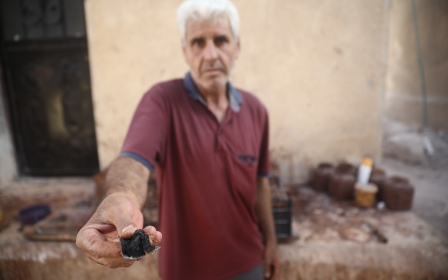In pictures: The Syrian woman who lost all her six children to war
Nine years of war have devastated Syria, leaving some 11 million people displaced from their homes, either as internally displaced or refugees around the world.
Once a country of 23 million people, Syria has lost half a million lives since Bashar al-Assad's government violently cracked down on protests against his rule, sparking the civil war. Some 150,000 others are missing.
The war has taken a heavy toll on the Syrian families who lost their breadwinners.
In Idlib province, the last remaining opposition stronghold in the country, more than four million people endure severe shortages of life's most basic necessities.
One resident, 60-year-old Samiha Sariya, lost her six children in the war between 2012 and 2020.
Sariya (also known as Umm Abdo) is now left looking after her 16 grandchildren, the eldest of whom is 13 years old.
“I had six children: Abd al-Rahman, Mahmoud, Zakaria, Fadi, Nader, and the youngest was Wael.”
In 2012, Umm Abdo lost her two youngest sons, Wael and Nader, who were fighting with one of the armed factions against Assad's forces.
Two years later, she lost Zakaria and Fadi after their participation in battles in the southern countryside of Aleppo. They left behind five children.
"I lost my son Mahmoud, who is my middle son, after a sniper shot him in the head in a street in the city of Idlib, in which we live now. He has three children, the eldest of whom is eight years old.
“Abd al-Rahman, my eldest son, was killed in late 2018 as a result of a double-tap bombing by the warplanes on the residential neighbourhood in which we live.”
Abd al-Rahman had three children, the eldest of whom is Kanjo, who at 13 is Umm Abdo's only grandchild old enough to help her secure income.
Umm Abdo lives in an old, shabby home with her grandchildren, without any other breadwinner or source of livelihood. Her neighbours, however, support her sometimes by donating food and clothes for the children.
After his father passed away, Kanjo has been working in the industrial zone in Idlib at a car repair shop, with a salary that does not exceed $4 per week.
He had to quit education at an early age to make time for his work to support his grandmother, siblings and cousins.
“My father used to sell vegetables,” Kanjo tells Middle East Eye. “He had a small shop in the market. My father’s shop used to generate some money for us with which we could secure our livelihood.”
"My job is very difficult, because I work in car repair. I wake up early in the morning around 7am, and I go to work and don't come home until 7pm," he adds.
Middle East Eye propose une couverture et une analyse indépendantes et incomparables du Moyen-Orient, de l’Afrique du Nord et d’autres régions du monde. Pour en savoir plus sur la reprise de ce contenu et les frais qui s’appliquent, veuillez remplir ce formulaire [en anglais]. Pour en savoir plus sur MEE, cliquez ici [en anglais].




